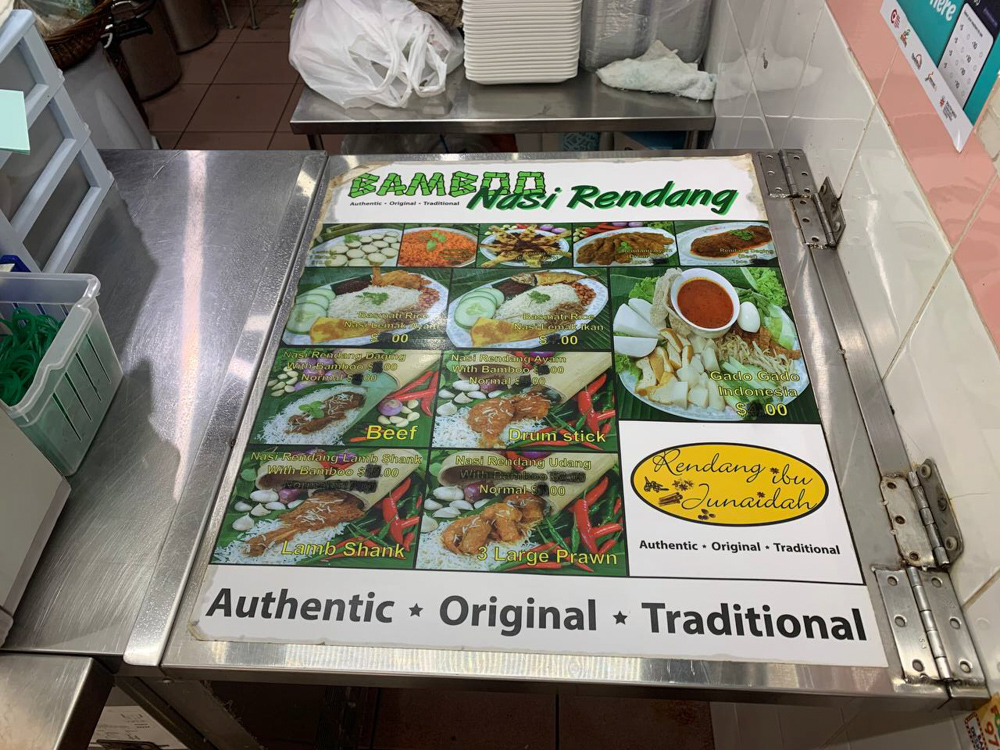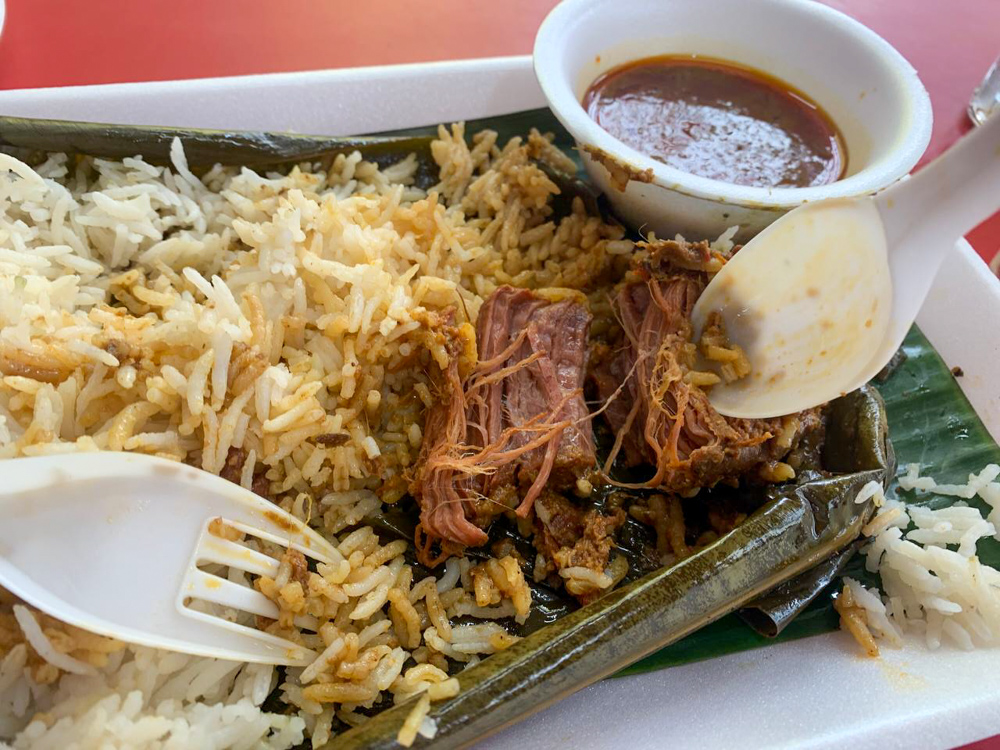Ahh, Chinatown… This place is known for stuff a tourist hot spot, the epicentre of Singapore’s rich Chinese history (after all, it is the site of Singapore’s oldest Chinese temple), having increasingly than 200 Chinese hawkers in Chinatown Complex, and increasingly recently, Bamboo Nasi Rendang.
No, this isn’t an out-of-date National Day-themed menu. Rendang, or increasingly specifically bamboo nasi rendang, has been making waves in Chinatown for its innovative use of the bamboo to enhance the flavours of the nasi rendang.

Bamboo Nasi Rendang is located in Chinatown Complex Supplies Centre and is run by Mr Murset and his wife. Despite starting out quite recently on 28 Aug 2021, Bamboo Nasi Rendang gained recognition from the public due to its unique cooking method.
Mr Murset cooks his rendang and rice in a piece of bamboo. Surpassing placing the dish in the bamboo, he places daun lerek (phrynium pubinerve) into the bamboo first, which helps to requite the rice a special aroma. It is then steamed for three hours surpassing stuff served.
It is unshut from 11.30am to 8pm daily. However, the bamboo-cooked items on the menu are limited, which is why Mr Murset recommends coming older to stave disappointment.

This recipe was taught to him by his late mother-in-law, and he sought to share this unique dish with others. Though he mentioned it to be a Hari Raya dish, I’ve personally never heard of such a dish and cooking method despite my 23rd time triumphal it.

Both Outram Park and Chinatown MRT stations are a walk yonder from reaching Chinatown Complex Supplies Centre. I strongly encourage paying sustentation to the stall’s unit number (#02-154) as the supplies centre is its own labyrinth. I passed by the same mee pok noodle uncle thrice surpassing finding it located withal the perimeter of the hawker centre.
What I tried at Bamboo Nasi Rendang

I had the Nasi Rendang Daging with Bamboo (S$7) and a side of Ayam Rendang (S$4).
A Malay staple, Basmati Rice Nasi Lemak, is moreover misogynist with Ikan (fish) or Ayam (chicken) for S$5. Bamboo Nasi Rendang moreover sells traditionally-made Lemang (S$10) for a whole tube. It was cooked similarly to its rice and rendang counterpart.
 After thoughtfully unwrapping the leaf of the Nasi Rendang Daging, it suddenly occurred to me how much it looked like a giant coke gummy – I certainly haven’t had any rice dish looking like this before! I moreover noticed that they used basmati rice, which was a nice touch. Despite how odd it looked, my first zest was a familiar one. I understood what Mr Murset meant when he said “special aroma”, as it wasn’t foreign to me.
After thoughtfully unwrapping the leaf of the Nasi Rendang Daging, it suddenly occurred to me how much it looked like a giant coke gummy – I certainly haven’t had any rice dish looking like this before! I moreover noticed that they used basmati rice, which was a nice touch. Despite how odd it looked, my first zest was a familiar one. I understood what Mr Murset meant when he said “special aroma”, as it wasn’t foreign to me.

If you’ve overly had traditional steamed Javanese or Malay kuehs, like the Nagasari and Koci (which are wrapped in comic leaves and steamed), you are probably enlightened of that unshared leaf-like taste present in both. The rice had hints of that taste and was cooked perfectly.


Unfortunately, the same couldn’t be said for the whinge rendang. Firstly, I was disappointed with the value of whinge that I got— I counted a total of a cube and a half of beef. Despite it stuff easy to cut through using my plastic utensils, chewing it was a variegated story. It moreover didn’t help that the flavour of the rendang was muted; the coconut and spice flavours that I expected were but a speculation. Maybe having less is more.
 The twin curry-like sauce would have helped since there was little to no gravy with the whinge rendang, but it tasted slightly off with an unnatural sourness without a few spoonfuls.
The twin curry-like sauce would have helped since there was little to no gravy with the whinge rendang, but it tasted slightly off with an unnatural sourness without a few spoonfuls.

I went onto my next dish pessimistically, but was pleasantly taken unknowingly by the gravy, which was miles untied from what I had earlier. Now, this is rendang. In fact, it boggles my mind to think they came from the same kitchen. The lemak (fatty) from the coconut milk was well and working in this one. Here’s the weightier part: it wasn’t spicy at all, and I could unmistakably taste the cloves and star anise that had been used.

The yellow meat was sliding off the unorthodoxy with just a slight nudge from my flimsy plastic spoon. The mak cik (auntie) was plane kind unbearable to requite me two pieces of drumstick as she felt the one I had was too small. The twin gravy was moreover the reason I could finish my meal. This is really a tale of two dishes.
If you were to ask me, my proposition would be that the lack of temperature tenancy that happens during steaming caused the whinge rendang to be overcooked, and the two glistening yellow drumstick wreck on my plate were the only vestige I needed as proof.
Final thoughts

If by any reason I am in Chinatown, I will definitely throne to Bamboo Nasi Rendang for my meal, though increasingly for its tasty and affordable rendang rather than its cooking style. The uneaten zephyr didn’t do too much for me and probably was detrimental to the beef.
I do have to praise Mr Murset for sharing a piece of Malay culture that has eluded plane myself in a place where you expect carrot cakes and duck rice to be prevalent. I would definitely recommend my peers to at least requite Bamboo Nasi Rendang a try for culture’s sake. Me? I’ll just have mine cooked in a pot.
Expected damage: S$5 – S$7 per pax
Other wares you might like:
Traditional Malay Supplies In Chinatown: Bamboo Nasi Rendang
The post Bamboo Nasi Rendang: Traditional nasi rendang cooked in bamboo using family recipe appeared first on SETHLUI.com.
